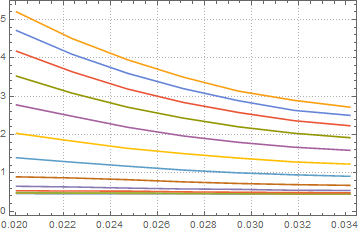I have one combined data with first number as the x-value and the remaining as different y-axis values (y1,y2,y3...). How do I break this combined list, data= (x,y1,y2,y3...) into smaller lists, such that data1=(x,y1), data2=(x,y2), data3=(x,y3) and so on. A sample data is provided below. There are 13 different y-values corresponding to each x-value (0.020024338, etc)
data = {{0.020024338, 0.46718468, 0.47932421, 0.4963509, 0.54065813,
0.65672949, 0.90251868, 1.3993448, 2.0366537, 2.7787049, 3.5291491,
4.1795025, 4.7176233, 5.2050893}, {0.022380134, 0.46261264,
0.47904547, 0.48048812, 0.53233204, 0.63802768, 0.87323611,
1.2855847, 1.8349797, 2.4843739, 3.0854011, 3.6431969, 4.0993234,
4.5086694}, {0.024735928, 0.46659667, 0.47086932, 0.48182777,
0.53003113, 0.60881906, 0.82828889, 1.1792591, 1.6458275,
2.1951179, 2.7178107, 3.1922793, 3.6018543,
3.9553359}, {0.027091718, 0.46147435, 0.4661452, 0.47106584,
0.51119942, 0.58587206, 0.77147002, 1.0795141, 1.5085768,
1.9689408, 2.4348231, 2.8437078, 3.2039729,
3.5031466}, {0.029447506, 0.45854677, 0.46537594, 0.4661371,
0.50055295, 0.57566797, 0.72922597, 1.006301, 1.3908136, 1.8015069,
2.2057531, 2.5789405, 2.8856884, 3.136435}, {0.031803289,
0.45134029, 0.45601075, 0.46374043, 0.49128087, 0.55187622,
0.69920774, 0.95526727, 1.2911787, 1.6753659, 2.0387226, 2.3660197,
2.6352631, 2.8969679}, {0.034159069, 0.44936824, 0.45563798,
0.46621482, 0.48637763, 0.54613861, 0.68024646, 0.91613335,
1.2340513, 1.5942974, 1.92385, 2.2354871, 2.5057308, 2.720232}}

